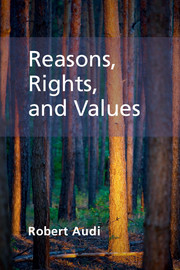Introduction: practical reason, moral justification, and the grounds of value
Published online by Cambridge University Press: 05 May 2015
Summary
Reasons for action, for belief, and for desire are central in human existence. We regularly stake our future on our reasons. For one or another reason, we promise resources and time, trust other people, buy and sell property. Reasons can be good or bad, conclusive or inconclusive, premeditated or spontaneous. They may arise from inference, but they may also produce it. They may or may not be moral in kind; and when they are moral, they may or may not be based on intuition and may or may not be grounded in some conception of moral rights. Reasons are both central in the constitution of virtue and essential in the motivation of action that expresses virtue. In our political activities, reasons play a special role. How they should figure in the conduct of conscientious citizens, and whether religiously based reasons are on a par with secular reasons is much debated. This is a central question for understanding civic virtue, and that in turn is important for the theory of liberal democracy.
This book is about reasons in all the connections just indicated, and it approaches the topic of reasons with an eye to structure, content, and grounds. The place of reasons in ethics is often directly in view, and the book bears on the nature and scope of moral obligation as well as on the nature and basis of intrinsic value. Related to all these topics is the question of how we can know what reasons we have and what acts are rational on the basis of them. What follows is an indication of the focus of the individual chapters.
I Reasons for action
Reasoning is characteristic of human beings. But what is it? Is it essential for rational action? How is it related to reasons? And how, in turn, are reasons related to value? The essays in Part I provide accounts of all four of these notions and say much about their interconnections.
- Type
- Chapter
- Information
- Reasons, Rights, and Values , pp. 1 - 10Publisher: Cambridge University PressPrint publication year: 2015



